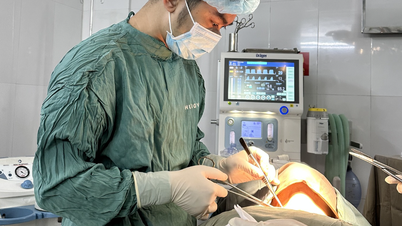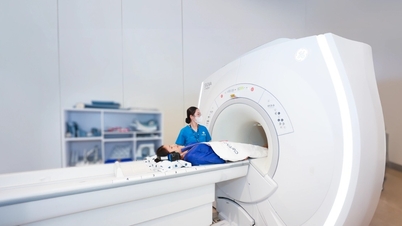
Folic acid fortification is a very important public health program - Photo: FREEPIK
AFP news agency confirmed that warnings that the public should avoid folic acid, and that taking too much could lead to harmful effects including cancer , were misleading.
Correct understanding of the role of folic acid
A Facebook post on June 27 said: "Some fortified cereals (refined grains with added nutrients - PV) are not more nutritious. Processing removes natural nutrients, then they are sprayed with synthetic folic acid - a man-made version of vitamin B9."
The article also states: "Up to 60% of people carry the MTHFR gene mutation, which makes it difficult or even impossible for them to metabolize folic acid. Their bodies store folic acid as a toxin instead of using it."
On TikTok, a man claimed: "Studies show that 90% of people who consume fortified foods or flour have unmetabolized folic acid in their bodies. This can impair immunity and is linked to certain types of cancer in some people."
According to AFP news agency, folate is a B vitamin found naturally in foods such as dark green leafy vegetables, beans and eggs. The synthetic form of folic acid, added to foods and supplements, has been shown to be better absorbed.
Folate is needed for DNA creation and protein modification, and is especially important during pregnancy because it helps prevent neural tube defects such as spina bifida.
The US Public Health Service recommends folic acid supplementation before and during early pregnancy, because most neural tube defects occur in the first four weeks.
Faced with the risk of folate deficiency, several countries have required folic acid to be added to bread, cereals, and pasta—a measure that has dramatically reduced the rate of neural tube defects in the United States and Canada since its introduction in 1998.
"Folic acid fortification is a very important public health program," emphasized Professor Walter Willett, an epidemiologist and nutrition expert at the Harvard TH Chan School of Public Health (USA).
Folic acid has many benefits
Outside of pregnancy, adults are recommended to take 400 micrograms of folate a day. Professor Walter Willett cites evidence that folic acid, in addition to reducing the risk of neural tube defects, also helps reduce the risk of stroke.
"In an age of so many concerns, folic acid supplements in food are not one of them," Professor Willett told AFP via email. "However, taking more than 400 micrograms a day is not necessary unless medically indicated. Too much of anything is bad."
The National Institutes of Health (NIH) recommends a maximum daily intake of 1,000 micrograms of folic acid. Studies have shown that long-term use of this amount may mask a vitamin B12 deficiency.
Regarding the gene variant, the US Centers for Disease Control and Prevention (CDC) affirmed: "People carrying the MTHFR gene variant can still metabolize all types of folate, including folic acid."
Similarly, the University of North Carolina Children's Hospital said current guidelines do not recommend MTHFR testing because these gene variants are common in the community and do not have a significant impact on health or clinical treatment.
From another perspective, medical professor Raphael Cuomo (University of California, San Diego) told AFP that there is evidence that folic acid supplements can help prevent cancer.
If you get less than 200 micrograms a day, your cancer risk may even increase. He stressed: folate is essential for maintaining healthy cell function.
One study also found that adequate folate intake may help reduce the risk of breast cancer in people who regularly drink alcohol.
Some articles recommend avoiding folic acid and using methylfolate, the biologically active form of folate, instead. However, Professor Cuomo asserts: " There is no evidence that any particular form of folate causes cancer ."
The concern, he said, is mainly with people who have had cancer or precancerous lesions. In cases of long-term use of high doses of folic acid, he said, "there is little evidence to suggest an increased risk of cancer recurrence."
But if a risk does exist, it's likely due to regular supplement use, not the fortified foods themselves.
According to the US Food and Drug Administration (FDA), dietary supplements are products taken by mouth, containing a "dietary ingredient" such as vitamins, minerals, herbs, amino acids... to supplement or support the diet. They can also be in the form of extracts or concentrated essences and exist in many forms such as tablets, capsules, softgels, gel capsules, liquids or powders.
According to the World Health Organization (WHO), fortified foods are foods or spices that have been supplemented with one or more vitamins and minerals to increase their nutritional value, compensate for micronutrient losses during processing, and provide public health benefits with the lowest possible risk.
Source: https://tuoitre.vn/afp-lam-ro-tin-don-dung-qua-nhieu-axit-folic-co-the-gay-ung-thu-20250711001249543.htm


![[Photo] General Secretary To Lam attends the ceremony to celebrate the 80th anniversary of the post and telecommunications sector and the 66th anniversary of the science and technology sector.](https://vphoto.vietnam.vn/thumb/1200x675/vietnam/resource/IMAGE/2025/9/29/8e86b39b8fe44121a2b14a031f4cef46)


![[Photo] General Secretary To Lam receives US Ambassador to Vietnam Marc Knapper](https://vphoto.vietnam.vn/thumb/1200x675/vietnam/resource/IMAGE/2025/9/29/c8fd0761aa184da7814aee57d87c49b3)
![[Photo] National Assembly Chairman Tran Thanh Man chairs the 8th Conference of full-time National Assembly deputies](https://vphoto.vietnam.vn/thumb/1200x675/vietnam/resource/IMAGE/2025/9/29/2c21459bc38d44ffaacd679ab9a0477c)
![[Photo] Many streets in Hanoi were flooded due to the effects of storm Bualoi](https://vphoto.vietnam.vn/thumb/1200x675/vietnam/resource/IMAGE/2025/9/29/18b658aa0fa2495c927ade4bbe0096df)





























































































Comment (0)